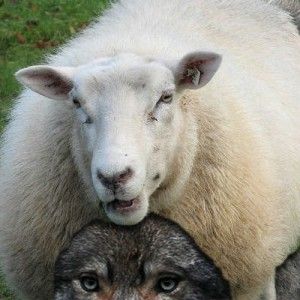Wolf for Thanksgiving dinner — a Fairy Tale
by CalWatchdog Staff | November 22, 2012 2:11 am
 [1]Nov. 22, 2012
[1]Nov. 22, 2012
By Mark Cabaniss
Democracy, it has been said, is two wolves and a sheep voting on what to have for dinner.
Yes, the sheep gets to vote. And yes, in theory he could appeal to one of the wolves to break rank and vote with him instead of the other wolf. But in reality, the sheep loses. Every time.
The only way that the sheep could win, in a closed system, or zero-sum game, would be for him to convince one of the wolves that the other wolf would make a tastier meal than would the sheep himself. Alternatively, he could try to convince one or both of the wolves that they are not, in fact, in a zero-sum game. Historically, the sheep has had a difficult time doing this.
We can construct a simple model with only three voting blocs, each of which considers only its own economic interests when voting, each represented by one of the animals:
1. People who don’t pay taxes (Transfer Wolf);
2. Public employees (Public Wolf);
3. Private sector employees (Sheep).
At dinner time — oh, excuse me — voting time, there are two propositions on the ballot:
A. Shall we raise (or decrease) taxes and use the money to raise (or decrease) spending on Public Wolf?
B. Shall we raise (or decrease) taxes and use the money to raise (or decrease) spending on Transfer Wolf?
Voting
The voting goes like this: On Proposition A, Public Wolf votes to raise taxes and raise his own pay. Sheep votes to lower taxes and to lower Public Wolf’s pay. Public Wolf and Sheep are at a stalemate.
Transfer Wolf sits this vote out. Since he doesn’t pay taxes, he doesn’t care what tax rates are. Nor does he care how much Public Wolf is paid, unless — unless he is paid to care.
On Proposition B, Transfer Wolf votes to raise his own benefits and to raise taxes to pay for them. Both Public Wolf and Sheep vote against him.
Transfer Wolf has a problem. He has been outvoted. But luckily for him, Public Wolf also has a problem: He is in a stalemate with Sheep. The two wolves realize that they need each others’ votes, so they agree to work together, against Sheep. Each will support the other’s position, and Sheep will be outvoted on both propositions.
In actual practice, the evidence suggests this is exactly what is happening — transfer payment recipients and government workers have formed a successful political coalition. According to a recent article[2] by demographer Nicholas Eberstadt, since 1960 total United States transfer payments have grown from $24 billion to just short of $2.2 trillion in 2010, nearly a 100-fold increase in the last half century.
Simultaneously, total government spending, federal and state and local, has gone from about 24 percent of GDP in 1960 to about 36 percent in 2010[3], growth of 50 percent.
Nash equilibrium
A Nash equilibrium, as popularized in the book and movie “A Beautiful Mind[4]” about mathematician John Nash, posits a game stalemate dependent on two conditions: first, each player knows every other player’s strategy; second, despite knowing everything, each player is nonetheless unable to adjust his own strategy to make it more advantageous.
In politics, there are no secret strategies, since elections involve trying to gain adherents to your strategy over the other side’s. But in our simple Fairy Tale, even though the first condition for Nash equilibrium is there — everyone knows everyone else’s position — there is nonetheless no equilibrium.
Public Wolf and Transfer Wolf will continue to vote in tandem, and thereby grow; Sheep will continue to be outvoted, and shrink. If we graphed Sheep’s life expectancy, it would be a curve breaking straight down, inversely proportional to the growth of his two compatriots.
But when we consider the second condition necessary for a Nash Equilibrium, we see how Sheep can get out of his predicament: He simply has to change strategy and start competing with Public Wolf by directly bidding for Transfer Wolf’s vote.
Why hasn’t Sheep already thought of that? He could, after all, promise to cut Public Wolf’s pay and then split the savings with Transfer Wolf, much as Public Wolf promises to raise taxes and split it with Transfer Wolf.
The reason for this is history, and the simple inability to think past it.
Sheep has always been opposed to raising taxes, whether it is to increase the size and pay of Public Wolf or whether it is to increase the size and pay of Transfer Wolf.
But, just because Sheep has always been opposed to these ideas in the past does not mean that he has to stay opposed to them in the future. If Sheep could let go of his historical antipathy to Public Wolf and Transfer Wolf, he could seek to make a deal with one against the other.
Of course, there is yet one more way out for Sheep. He could potentially try to convince one or both of the wolves that their dinner choice is not a zero-sum game; that they could, in fact, join forces and go foraging in the woods together for something that all three animal friends could eat.
Historically, this approach has been a loser for Sheep. At dinner time, both of the wolves are usually too hungry to listen to reasoned pleas about thinking outside the zero-sum model.
So the only bet for Sheep may be to undergo a paradigm shift, overcome his qualms, and make a deal with one of the wolves to dismember and eat the other.
- [Image]: http://www.calwatchdog.com/?attachment_id=34824
- recent article: http://online.wsj.com/article/SB10000872396390444914904577619671931313542.html
- about 24 percent of GDP in 1960 to about 36 percent in 2010: http://www.forbes.com/sites/joshbarro/2012/04/16/lessons-from-the-decades-long-upward-march-of-government-spending/
- A Beautiful Mind: http://en.wikipedia.org/wiki/A_Beautiful_Mind_(film)
Source URL: https://calwatchdog.com/2012/11/22/wolf-for-thanksgiving-dinner-a-fairy-tale/